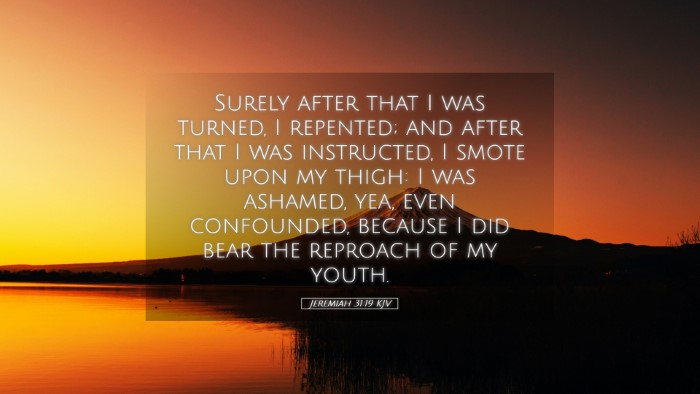Commentary on Jeremiah 31:19
Verse Text: "Surely after that I was turned, I repented; and after that I was instructed, I smote upon my thigh: I was ashamed, yea, even confounded, because I did bear the reproach of my youth."
Introduction
This verse from Jeremiah encapsulates a transformative moment of repentance and realization. As we delve into this text, we will explore the deep spiritual truths and implications as provided by esteemed public domain scholars like Matthew Henry, Albert Barnes, and Adam Clarke. Their insights bring a rich understanding for pastors, scholars, and theologians alike.
Contextual Background
The book of Jeremiah is a poignant reflection of the struggles faced by the prophet and the people of Israel during a time of impending judgment and exile. Chapter 31, particularly, is a section filled with hope and restoration, focusing on God's promises to His people despite their rebellion. Jeremiah 31:19 specifically addresses a personal turnaround, symbolizing a collective experience of Israel's realization of sin and the consequent need for repentance.
Analysis of the Verse
Turning and Repenting
Matthew Henry emphasizes the process of turning and repenting intrinsic to spiritual renewal. He notes that the phrase "Surely after that I was turned" indicates a deliberate action of turning away from sin towards God. This turning is intentional and signifies genuine contrition. Similarly, the act of repenting denotes an inner change—an acknowledgment of wrongdoings, moving beyond mere regret to profound sorrow for sin.
Instruction and Self-Reflection
Albert Barnes adds that instruction follows repentance, which illustrates a key principle of spiritual growth. Once one repents, true understanding comes, leading to deeper spiritual insights. The acknowledgement that the speaker "smote upon my thigh" is a symbolic act of grief and reflection on personal sinfulness. It conveys a physical manifestation of emotional turmoil, showcasing the seriousness of his condition before God.
Shame and Confusion
Adam Clarke provides a detailed analysis of the feelings of shame and confusion described in the verse. He explains how, upon realizing the actions of one's youth, the speaker is overwhelmed by a sense of dishonor and regret. This shame reflects a deeper acknowledgment of how one's past actions have resulted in reproach, both personally and socially. Clarke suggests that such emotions are essential for true repentance, as they signify a heart that understands the weight of sin.
Theological Implications
Jeremiah 31:19 serves as a rich text for exploring themes of human fallibility, divine forgiveness, and spiritual restoration. Each scholar reinforces the idea that through repentance, individuals can experience profound transformation. This text emphasizes God’s readiness to forgive those who genuinely turn back to Him.
The Nature of God’s Forgiveness
The broader context of Jeremiah 31 highlights God's covenantal love for Israel and His desire for reconciliation. As mentioned by Henry and Barnes, God’s forgiveness is not a mere cancellation of debt but involves a reestablishment of relationship predicated on true remorse and commitment to change.
Application for Believers
- Personal Reflection: Believers are encouraged to assess their own lives for areas needing repentance. The personal experience of the speaker in this verse is a call for all to evaluate their relationship with God.
- Community Healing: Just as Israel is addressed collectively, so too are modern congregations called to together confront their communal shortcomings and seek restoration.
- Hopeful Anticipation: The promise of renewal and restoration speaks powerfully to those who feel burdened by past sins, offering hope that turning back to God leads not only to forgiveness but also to an enriched spiritual life.
Conclusion
In summary, Jeremiah 31:19 serves as a profound testament to the process of repentance and the transformative power of divine grace. Insights drawn from the commentaries of Matthew Henry, Albert Barnes, and Adam Clarke converge to illuminate the journey from sin to redemption. For pastors, students, and scholars, this verse not only challenges individual believers to embrace repentance but also encourages the community to seek collective reconciliation with God.


